WHO’S IN CHARGE HERE?
A TIME OF NEW BEGINNINGS AND FRESH OBEDIENCE
The New Generation is Circumcised at Gilgal
The Amorites and Canaanites heard of the Jewish nation miraculously crossing the Jordan River on dry ground during flood season. It was no little matter. They were gripped with fear. “Their hearts melted.” (5:1)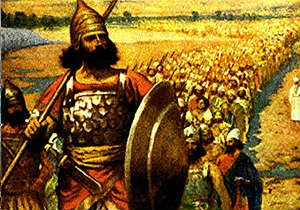
Joshua 5:2a (NASB) 2 At that time the LORD said to Joshua….
Think about the dramatic significance of the phrase “at that time”.
- They were just given a validating sign of God’s favor- “the LORD had dried up the waters of the Jordan before the sons of Israel (some 2 million soldiers and civilians) until they had crossed” (5:1).
- This miraculous crossing was a validating sign of Joshua’s divinely appointed leadership.
- They had the ark of the righteous testimony of Christ borne on two staves of wood and carried on the shoulders of the Kohathite priests. They could all see that it had stood in their place in the midst of what would otherwise be death in the floodwaters of Jordan.
- Moses (representing the Law) had been replaced by Joshua (representing salvation by grace through faith in the greater Joshua-Jesus- God to the rescue).
- The testimony of the Lord’s favor upon the people of Israel put fear in the hearts of the Canaanites.
To the natural mind, it would be opportune to quickly take territory, conquer Jericho, and move on to possess the land. But that was not God’s will. Consecration must precede conquest. The new life in the Promised land brought new commands. They were to mark the fulfillment of God’s promise to bring them into the land of milk and honey, with fresh obedience to new commands-
- Be consecrated (Joshua 3:5); This probably involved fresh washing, a period of abstinence, focusing on their covenant relationship with God.
- Be circumcised (Josh 5:2) (The Circumcision of the flesh of the male’s foreskin represented the cutting off the old life (our heritage in Adam) and beginning a new life anticipating the Promise (our heritage in Christ; Colossians 2:11). Because it involved the shedding of blood; it reminded the Israelites of the necessary blood atonement of the promised substitute.
- Celebrate the Passover (Josh 5:10) Remember the Lamb, and put out the leaven- (1 Cor 5:6-7)
- Change your diet (Josh 5:11-12) They were to no longer live on wilderness food, ‘manna’, but live off the fruit harvested in the Promised land, symbolizing being “in Christ”, on the ground of resurrection.
Joshua 5:2b, “Make for yourself flint knives and circumcise again the sons of Israel the second time.”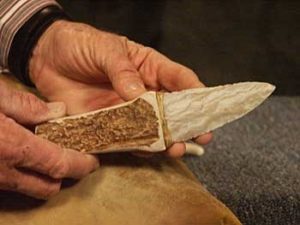
To the natural mind, it would not make sense to incapacitate your army in hostile territory. But this was not going to be a natural conquest.
Other cultures used circumcision as a rite of passage into adulthood. The people of Israel were called by God to use the sign as a mark in their flesh of their enduring faith in God’s covenant promise given to Abraham- that from his seed would come a great nation, many nations, kings, and a blessing that would flow to all nations (Gen 12: 2-3, 7; 15:4-5, 18-21; 17:11-14).
They knew that it was not the physical sign itself that saved them. The sign only had value if faith in God’s Word was in their hearts. This is why we have the expression in the Old Testament of the circumcision of the heart. Our trust in God is not proved merely by outward conformity to laws or ritual, but in our daily walk of responsiveness to the revelation of God’s will in His Word (Lev 26:41; Deut 10:16; Jer 9:25; Ezek 44:7). God’s people were to put their trust in Him, not the mark of circumcision.
The sign of circumcision also indicated that you belonged to the covenant of Abraham and therefore were under obligation to walk before the LORD as a believer. For thirty-eight years, God’s people had wandered from that relationship of trust. The time had come for the sons of Israel to renew their covenant commitment and undergo the surgery that would have been less painful had the command been kept to circumcise the males on the 8th day of their lives, marking them as a people belonging to God (Leviticus 12:3).
The Lord said to “Circumcise again the sons of Israel the second time.” A male could not be circumcised again any more than a person can be ‘born again’ again. But from God’s perspective, this was the second time He called them to obedience as a people. He called them to obedience through Moses (the Law), but they had disobeyed. No one had been circumcised since Passover was celebrated in the wilderness of Sinai (Numbers 9) 38 years earlier. Now He was giving them a call to fresh obedience, a new commandment. He was calling them to obedience on the new ground of the Promised Land (resurrection ground) through a new voice– Joshua (whose name means salvation- and whose ministry typifies grace).
Joshua explains why the new generation needed to be circumcised.
Joshua 5:5 (NASB) 5 For all the people who came out (of Egypt) were circumcised, but all the people who were born in the wilderness along the way as they came out of Egypt had not been circumcised.
The Lord was pleased with this obedience saying to Joshua,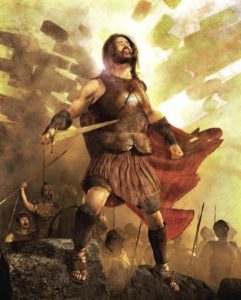
Joshua 5:9 (NASB) 9 Then the LORD said to Joshua, “Today I have rolled away the reproach of Egypt from you.” So, the name of that place is called Gilgal to this day.
The Lord wants to treat us as believers, new creations in Christ, not as unbelievers, those who are still in their sins. We are not to act like unbelievers but as those who hear the word of God and do it.
GILGAL means rolling, or ‘circle of stones’ and a circle of stones has been found by archeologists there.
The covenant was renewed not only with the outward sign of circumcision but with the keeping of the Passover.
On the day after the Passover, they eat from the fruit of the land, a type of partaking of the fruit of Christ’s resurrection life.
Interestingly, the manna ceases to fall the day after they eat from the fruit of the land.
Why this change of diet? It is a picture of living by a new source- the life of the One who gave the Promise and brought us out.
WHO’S IN CHARGE HERE? JOSHUA MEETS THE CAPTAIN OF THE LORD’S HOST.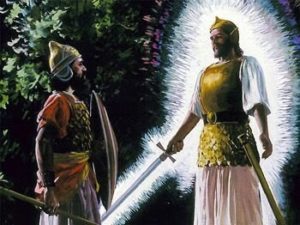
Joshua 5:13 (NASB) 13 Now it came about when Joshua was by Jericho, that he lifted up his eyes and looked, and behold, a man was standing opposite him with his sword drawn in his hand, and Joshua went to him and said to him, “Are you for us or for our adversaries?”
When Joshua looked up expecting to see the wall of the enemy’s fortified city, instead, he sees a man with a sword drawn. He queries, “Are you for us or our enemies?”
The man replies
“No; rather I indeed come now as captain of the host of the LORD.” And Joshua fell on his face to the earth, and bowed down, and said to him, “What has my lord to say to his servant?” Joshua 5:14 (NASB),
This is none other than a Christophany, a preincarnate visitation of the second person of the Trinity, Jesus Christ. No angel of God would receive worship, but this one does. He has come not to take sides but to take charge.
The key to Joshua’s victory would be his obedience to what the Supreme Commander would give of both strategy and victory; both would come from Him.
The Lord has said to Moses:
Joshua 1:5 (NASB). Just as I have been with Moses, I will be with you; I will not fail you or forsake you.
Moses encountered the Lord in a burning bush and was told to take off his shoes, acknowledging the ground made holy by the Lord’s presence. Now Joshua is told to do the same.
Joshua 5:15 (NASB) 15 The captain of the LORD’S host said to Joshua, “Remove your sandals from your feet, for the place where you are standing is holy.” And Joshua did so.
Chapter divisions might confuse you, causing you to think that this Captain just disappeared.
But he speaks again in verse 2 of chapter 6.
Joshua 6:2-4 (NASB) 2 The LORD said to Joshua, “See, I have given Jericho into your hand, with its king and the valiant warriors. 3You shall march around the city, all the men of war circling the city once. You shall do so for six days. 4 Also seven priests shall carry seven trumpets of rams’ horns before the ark; then on the seventh day you shall march around the city seven times, and the priests shall blow the trumpets.”
JOSHUA 6- THE CONQUEST OF JERICHO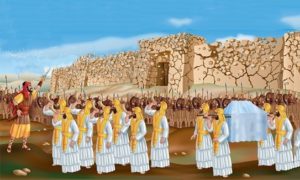
Where is Joshua getting his orders from? The Captain of the Lord’s host, whom we know is now head of the church, the body of Christ who fills all things in every way.
What has He called them to do? Receive a victory. How? By obeying His command. Victory is promised. But the sureness of victory does not discharge us from our prescribed duties or negate the indispensability of our continued trust and obedience. These are His ordained means of realizing victory.
Fresh obedience is the pattern for all of God’s servants. Joshua did not lean on his own understanding of siege warfare that starves the enemy, scaling the walls, using battering rams, or launching surprise attacks tunneling beneath the ground. He did not confer with flesh and blood but instead trusted in the revealed will of God, no matter how strange.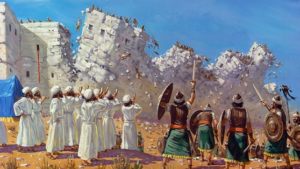
The plan calls for unquestioning submission to God. This would be demonstrated in both their action and restraint; in what they did and what they did not do. All the glory would go to God. What was there for Joshua, the priests, and the soldiers to boast in? What did they do to cause the walls to fall flat? The ark was to be given the place of honor, being central in the order of the procession.
Joshua was told to march around the city, circling it once every day for six days. God never called anyone else to that particular strategy. The particulars were not meant to be a formula for the conquests of cities to come.
“Seven priests carrying seven trumpets before the ark, then on the seventh day you shall march around the city seven times, and the priests shall blow the trumpets.”
We have the repetition of seven, meaning enough or complete, anticipating the sufficiency of Christ’s work of redemption.
With that long blast, the people shall shout, and the wall of the city will fall down flat, and the people can charge the city.
What would seem foolishness to the citizens of Jericho would be their undoing. Opportunity was given for the inhabitants of this military fortress to surrender. But only Rahab, the notorious yet God-fearing female innkeeper, submitted to the communication of God’s Word through the spies.
Let us not despise what God chooses as His means to bring the enemy’s defeat and the captive’s liberation, such as the foolishness of preaching.
1 Corinthians 1:18 18 For the word of the cross is foolishness to those who are perishing, but to us who are being saved it is the power of God.
1 Corinthians 1:21 21 For since in the wisdom of God the world through its wisdom did not come to know God, God was well-pleased through the foolishness of the message preached to save those who believe.
THE SIN OF ACHAN
Everything in Jericho was to be reckoned as condemnable- placed under the ban. Nothing from the cursed city was to be possessed by God’s covenant people living in the Promised Land. Joshua pronounced a curse at the cost of the firstborn son of anyone who would try to rebuild this city (Joshua 5:26).
After the conquest of Jericho, Joshua sends men to spy on Ai. The spies report that in their estimation, only 2 or 3,000 soldiers will be required, as if their victory at Jericho taught them that the battle depended on army size! Their assessment of the enemy- “only a few men are there.” The result, however, is that the Israelite army is routed by the men of Ai. Why were they defeated? Not because of army size or military prowess, but because of sin in the camp.
The Lord speaks to Joshua,
Joshua 7:11-12 11 “Israel has sinned, and they have also transgressed My covenant which I commanded them. And they have even taken some of the things under the ban and have both stolen and deceived. Moreover, they have also put them among their own things. 12 “Therefore the sons of Israel cannot stand before their enemies; they turn their backs before their enemies, for they have become accursed. I will not be with you anymore unless you destroy the things under the ban from your midst.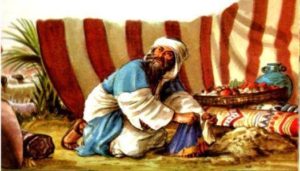
God promises that the guilty party will be destroyed by fire, along with all that belongs to him (Josh 7:15). Apart from a right standing with God in Christ, that is what awaits everyone. (Hebrews 10:27;30-31; 12:29)
The lesson is that you cannot play games with God and lie to the Holy Spirit.
One man, Achan, stole some of the items in Jericho that were devoted to destruction. His sin brings judgment upon the whole nation. God had to bring discipline to this new community from the start, even as He did in the early days of the New Testament church with the judgment of Ananias and Saphira, who lied to the Holy Spirit (Acts 5:1-11).
TODAY’S READING IN THE NEW TESTAMENT: LUKE 15:1-32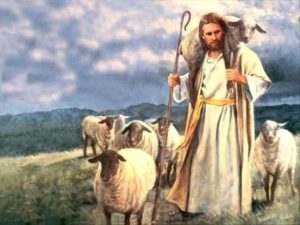
Jesus is criticized by the religious leaders for associating with tax collectors and people who were known for their notorious sins (Luke 15:1-2; Matt 11:19, Luke 7:34). They muttered, “This man welcomes sinners and eats with them.”
In response, Jesus proceeds to give three parables of four lost things: The lost sheep (Luke 15:3-7); the lost coin (Luke 15:8-10); the lost younger (prodigal) son (Luke 15:11-24) and the lost self-justifying elder brother (Luke 15:25-32).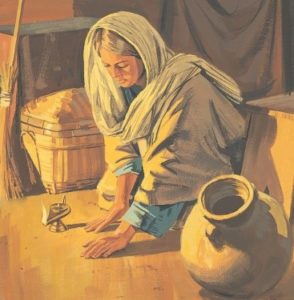
Jesus told these parables to highlight the fact that his critics, who called themselves members of the sheepfold of Israel, did not recognize the heart of the shepherd of Israel. He knew that those who thought they were in the household of salvation did not recognize the value of the coin of salvation. He was illustrating that although they presumed that they were sons of Abraham, with God as their Father, they did not know what life in the Father’s family is all about. They were criticizing Jesus for seeking to save those who are lost. Yet Jesus authoritatively announces that there is greater rejoicing over one sinner who repents, than ninety-nine who do not recognize their lostness, or their need to repent. These leaders were false shepherds, lacking a Shepherd’s heart. Jesus, a true shepherd, rejoices in the restoration of what was lost. There is rejoicing in the presence of angels over the repentant sinner (15:10).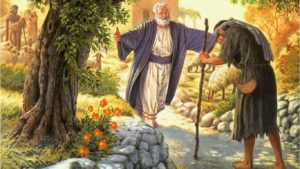
In the parable of the two lost sons, the Pharisees and the teachers of the Law are like the elder brother. They serve dutifully according to their own understanding but resent those who are objects of God’s mercy and fail to see their own need. They are lost to the Father’s love.
TODAY’S READING FROM THE BOOK OF PSALMS: PSALM 81:1-16
Asaph has earned the right to call us to joy. As a Psalmist, he has expressed both the highs and lows of human experience. He is not a superficial praise leader. Here he calls us to lift up our voices and strike up the band.
We have a lot to be thankful for. God has put holy days of thanksgiving on the calendar. The Jews had their 7 feasts. We see how they are prophetic signs of the ministry of Christ. We remember Christ our Passover (crucified as our sinless substitute), put away sin (Unleavened Bread), and is the First Fruit of the resurrection harvest (raised for our justification). He is our baptizer in the Holy Spirit (Pentecost) and the One who will return to this earth, announced with Trumpets (Feast of Trumpets), causing those who smote Him to mourn (Yom Kippur-Atonement) as He fulfills His promise to tabernacle among us (Feast of Tabernacles).
Israel can sing praises for God’s faithful dealings. We can praise God for His providential goodness- the story of Joseph’s exaltation to a position of Savior of his people (81:5). We can praise God for His deliverance- the story of how He brought them from their bondage in Egypt through the school of the wilderness (81:6) into the promised land.
The Psalm highlights the ruin that comes with a failure to heed (listen to and obey) the Word of God (Psalm 81:8-15).
However, the Lord makes His steadfast love and goodness clear:
Psalm 81:16 16 “But I would feed you with the finest of the wheat, and with honey from the rock I would satisfy you.”
TODAY’S PROVERB: (It follows the theme of the Psalm we just read)
Proverbs 13:1 1 A wise son accepts his father’s discipline, but a scoffer does not listen to rebuke.
PRAYER FOR THE NATIONS- We continue to Pray for China using the Operation World Prayer Guide. (p. 227-257)
PRAYER: O Lord, thank You for Your unfailing presence. We wait on Your Wisdom and Your command. You are the Captain of our salvation. We trust Your plan of salvation, stand ready to heed Your instruction as You lead us to defeat all enemies that war against our soul. Your love offers us Your best, in Christ, and we are thankful. Your Word strengthens us and corrects us. We gratefully receive both the nurture and the discipline You bring to our lives. May Your life and love be seen in us this day. In Jesus’ Name. Amen.
Pastor David
